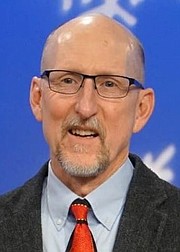OPINION: Political incivility in the time of coronavirus
COVID-19 has revealed daily heroism all around us, extraordinary and everyday heroes who care for our sick, deliver necessary goods, stock our stores and keep our society functioning.
The rest of us are doing our parts, too, staying home, social distancing, caring for our families. Not heroic, perhaps, but sacrificing normal life, jobs and in many cases incomes to keep our community safe. Most Idahoans, most days, in most ways, are helping get through a crisis unlike anything we’ve seen in modern times.
But a few people want to abuse this good will for personal or political profit. They connive to cheat residents out of their $1,200 federal checks, gouge their neighbors for masks or medicine, or gin up rumors or outrage to destroy political opponents.
As chairs of an Idaho working group for the National Institute for Civil Discourse, we were asked by Idahoan Keith Allred, now the NICD’s director, to launch the nation’s first state affiliate. In public forums this winter, we shared the principles of civil discourse and respectful civic engagement with audiences in Lewiston and Twin Falls. Our statewide tour was cut short by the coronavirus, but we’ve witnessed firsthand the hunger Idahoans have for civil conversation and respectful engagement to address our many differences.
Which is why it’s so troubling to see some people exploiting these troubled times. When times are hard, when so many of our friends and neighbors are hurt or scared or sick or alone, we all need to remember the importance of civil discourse and to exercise basic civic virtues.
Political protest and nonviolent civil disobedience are time-honored ways to hold the powerful to account. But when those acts cross the line into harassing or menacing behavior, they stop being constructive. Showing up at the homes of police officers or the governor is not just counterproductive, it pulls law enforcement and other public resources away from the legitimate needs we face as a community.
And because politics abhors a vacuum, it’s easy to distort the truth in this unusual campaign season. Political candidates in the May 19 mail-in election are finding it harder than ever to respond to negative attacks. Candidates can’t hold traditional rallies, speeches or meet-and-greets. They can’t knock on doors or visit community or civic groups. They can’t talk to voters at fairs and forums and farmers markets.
So voters have an extra responsibility this election season to not take negative attack at face value. Understand you may not be getting complete information. Be extra skeptical of unreasonable accusations about reasonable people, claims that are designed to outrage rather than inform. Unfortunately, the politics of personal destruction is often effective. “When the debate is lost, slander becomes the tool of the losers,” is wisdom attributed to Socrates. But whoever first said it, it’s worth remembering.
Candidates have an extra responsibility, too, to be available by phone and online so sincere voters who do want information can get it.
When times are scary, be wary of scare tactics. Recognize when people are trying to jerk your chain. Don’t share or like or repost social media messages that exploit fear and outrage. Schedule regular mental health breaks from your TV and your phone. Reach out to candidates about whom you have questions. Give him or her a chance to rebut what may be misinformation.
This is not an easy time for anyone, including those in public office. Decisions on isolating at home, limiting commerce and restricting business openings are not easy and not popular. But crisis demands decisive leadership. We need to heed our state and city leaders who are asking citizens to make sacrifices for the health and safety of us all, leaders willing to use their political capital to make these risky, unpopular decisions. And ignore the claims of opportunists from either extreme seeking only to attract attention.
We are three Idahoans of different politics and professions, coming from different business, government and media backgrounds. But we are agreed that especially at this time in our state and national life, we need citizens and leaders who seek to bring out the best in all of us, not play on our fears or stoke our anger.
Republican Congressman Mike Simpson summed it up: COVID-19 isn’t a Republican problem or a Democratic problem. “It’s an American problem. Stay calm, stay informed and stay home.” And that’s a bipartisan sentiment: His likely Democratic opponent this fall, Aaron Swisher, agrees with that advice.
If there’s ever a time to listen to the better angels of our nature, that time is now.
• • •
Butch Otter is the former Republican governor of Idaho; Walt Minnick is the former Democratic Congressman from Idaho’s 1st District; and Bill Manny is a political independent and longtime Idaho journalist.





